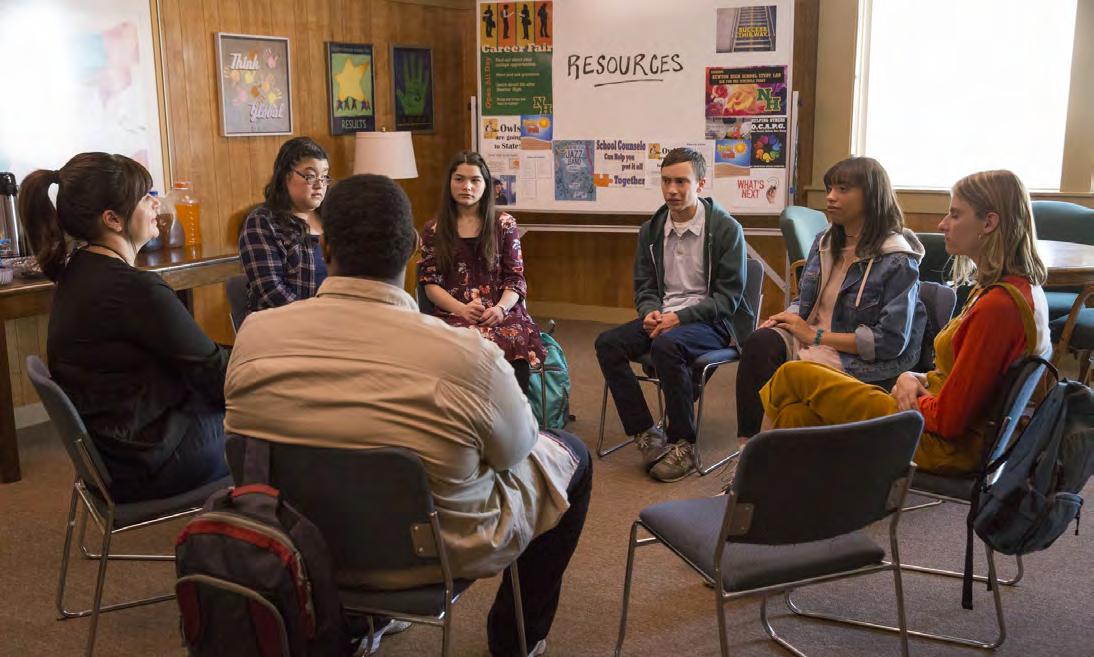
4 minute read
Systemic Racisim
Emily Rutledge
When a police ofcer walks past you on the street, what are your thoughts? How many times have you been questioned about your intentions while in a store? Have you ever had anyone comment on the colour of your skin? If you’re reading this and thinking, ”nothing” or “never”, then this article is for you. While we may like to think that skin colour doesn’t drastically afect how we move through society, it does. Everywhere. Across the world for people of colour, these are daily occurrences that have wide-ranging efects. While individual racism plays a part in these situations, the root issue is systemic racism, which this paper will address. Systemic racism or institutional racism, by defnition, is a form of racism that is embedded within society or organizations. It can lead to such issues as discrimination in criminal justice, employment, housing, health care, political power, education, and many other issues. This type of racism often goes unnoticed because of how deeply rooted in society it is; how ‘normal’ it is for the dominant culture.
Advertisement
Right now, here in New Zealand, systemic racism is prevalent. In 2020, there were reports of Māori youth in
Wairarapa being stopped and photographed by police on the street. In March 2021, this was revealed to be a nationwide practice. Police deny that there was any racial profling involved, but the evidence suggests otherwise.
The police admit there often isn’t any general reason for the photographs to be taken. Police Minister Poto Williams has now warned the police that they shouldn’t be taking photos of the public outside of the law, but there is still a vocal concern coming from Māori whānau.
If you read this and think “aren’t they just protecting the public?”, then you need to refect on that opinion. Imagine walking down the street with your friends and suddenly a police ofcer stops you, either to question you about what you’re doing or take your picture with details. Would you be confused or scared, maybe? Now consider the more intense fear involved when you are a racial minority, more likely to be harmed by the police. Within a systemically racist society, white people aren’t deemed ‘suspicious’. In a letter sent by Kelvin Davis, the Corrections Minister, regarding the wrongful treatment of women in New Zealand prisons, he acknowledged the need for change. Yet, only a month prior, he ignored the situation, saying that he’d been assured that prison staf were acting appropriately. Māori women make up 63% of the female prison population, which raises the question of mistreatment being connected to race, given how high this rate is and how often concerns of abuse within female prisons arise. This attitude prevailed until a full report was received from
the Chief Inspector. This letter means little until we see change, words without action, however, it is a promising start. Rose, another journalism student, and I had emailed Minister Kelvin Davis requesting an interview regarding prison systems within New Zealand. Due to his busy schedule, he was unable to respond in time for this article. From police on the street targeting Māori youth to the treatment of inmates in the prison system to the major disproportion of Māori population in New Zealand (15%) against the Māori population in prisons (50%), it is clear that systemic racism has taken hold in our own country. New Zealand’s core values include ‘fairness and equality’, but this is shown by these examples to be just words. This form of racism, however, extends beyond NZ borders: In Australia, systemic racism within the justice system has resulted in the disproportionate treatment of Aboriginal and Torres Strait Islanders to white people. Indigenous people make up 2% of the Australian population yet 28% of the adult prison population. In South Africa, Black urban shack-dwellers deal with the remains of Apartheid, their leaders still being imprisoned or killed for actively opposing the authorities. Apartheid was institutionalised racial segregation in South Africa from 1948 till the early 1990s and is still evident today.
In Guatemala, Mayan healer Domingo Choc was accused of witchcraft and was tortured and burnt to death by a mob, a ritual dating back to the 1600s. Does this show you we’ve evolved and progressed as we say we have?
Awareness and an understanding of systemic racism in today’s society is the only way it can be stopped. It will take time, but we must begin now. My paper only scratches the surface of systemic racism and I strongly encourage you to look further into the topic. Even though this article focuses on systemic racism, we can’t forget about the terrors of individual racism. This might be hard to accept, but we have all probably done or said something casually racist recently unknowingly. You know, laughing at a racist joke or saying nothing when a racist comment was made by a friend or family member. This is not right, but we should refect and accept these errors and become better aware of ourselves and work to change our attitudes. We must fght for those whose voices cannot be heard. If you are apart of the non-oppressed society, I ask you to use your privilege for good. Calling others out does not make you a bad person, or a “snowfake”, it makes you a concerned person. Do good by others and stand up for those who are less fortunate. Help make living on earth a better experience for everyone.










